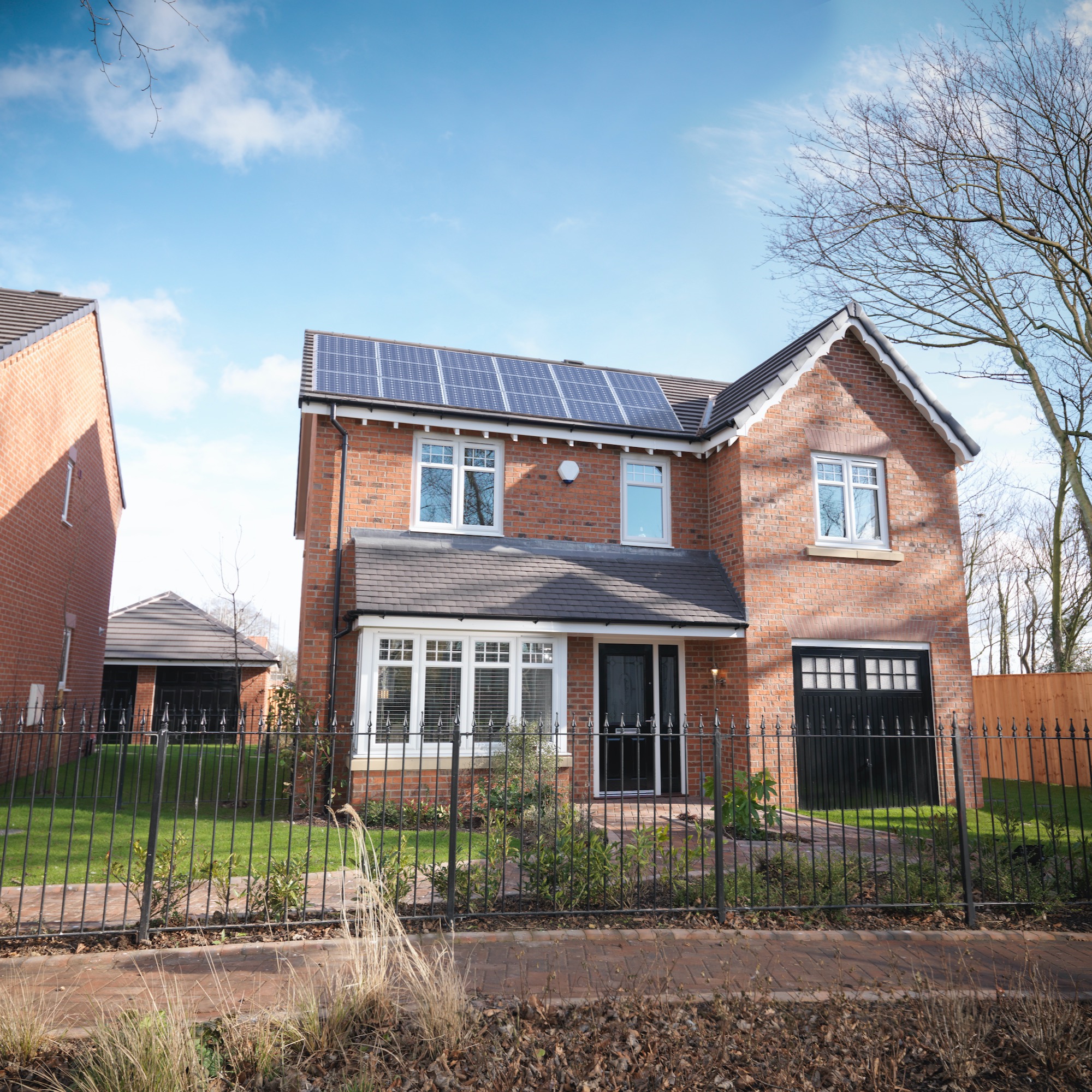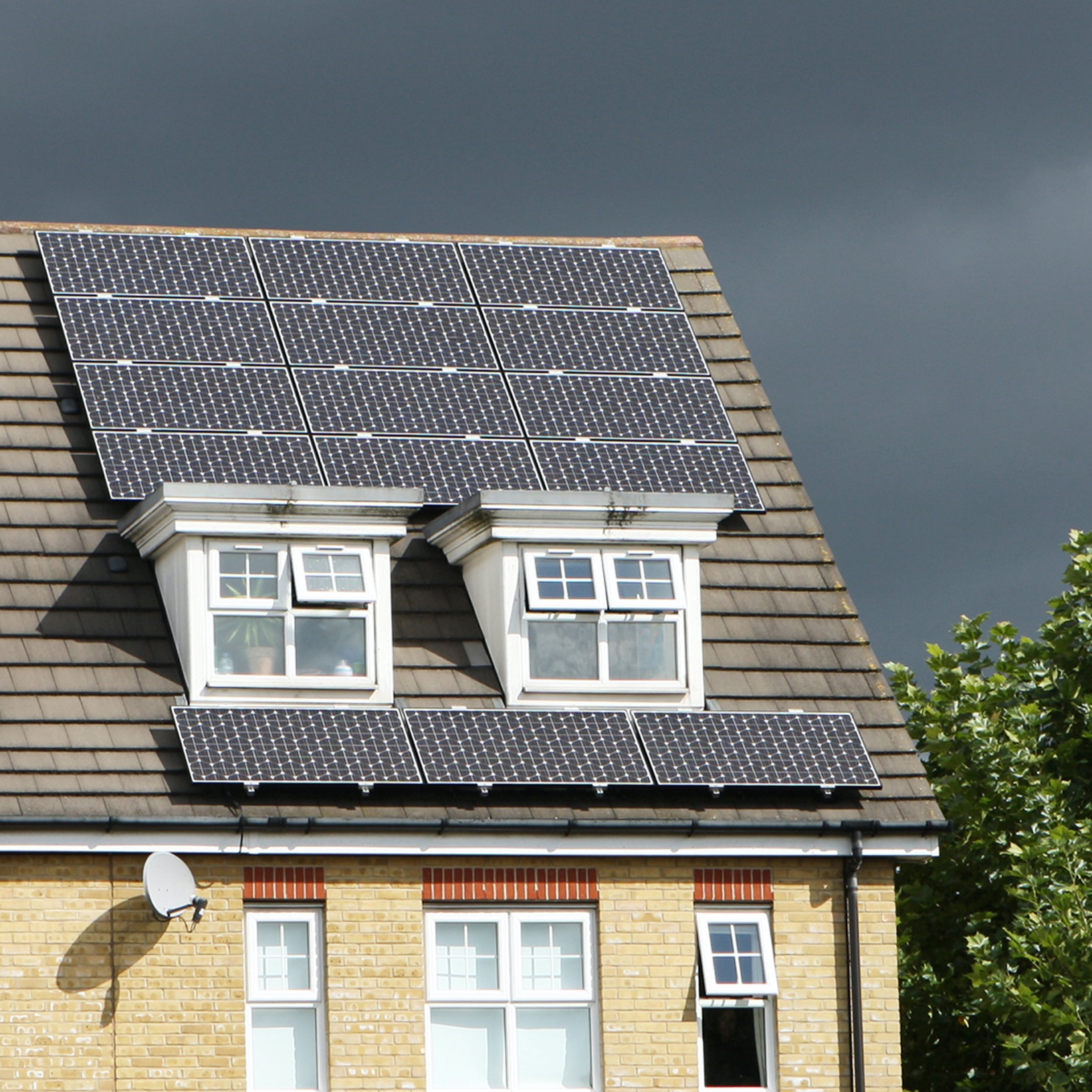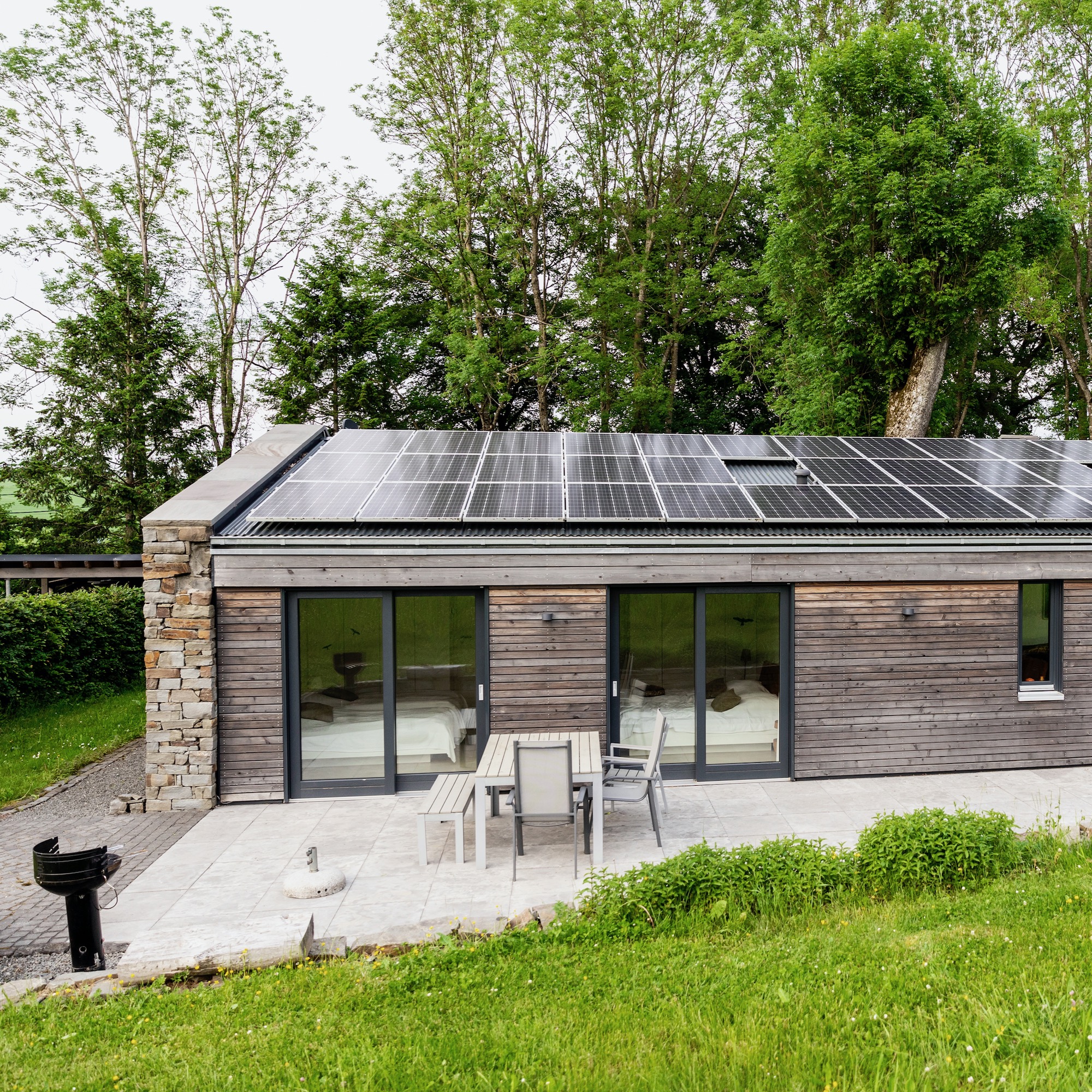How to clean solar panels – and why your bills might go up if you don’t
Everything you need to know about how to clean solar panels, maintain them and ultimately ensure they keep making you money

Ellis Cochrane
Knowing how to clean solar panels is essential to keep them working effectively. Since solar panels use light, which they convert to power, it's important to have a clear panel that allows that light to penetrate through.
If you have already added solar panels to your home or are considering the investment, this is a regular maintenance task you will need to factor in. After all the clouds are doing enough to cut down on your potential solar savings without a dirty or mucky panel adding to the problem.
‘Over several months, dirt, debris and bird droppings can accumulate on the surface of solar panels, which reduces their ability to absorb and convert sunlight,’ explains Brian Davenport, Co-Founder of The Solar Centre. But how do you go about cleaning solar panels, especially when you consider that most solar panels are located on roofs?

How to clean solar panels
While you can pay someone to clean your solar panels for you – and there's more on that below – the process of doing it yourself need not be too daunting. If you have all the right equipment to get the job done then you can save even more money by learning how to clean solar panels yourself. Plus, this will help cut down any ongoing solar panels costs. And it doesn't even need to be that regular, in case this puts you off.
‘Cleaning solar panels is very much like cleaning a window,’ explains Geo Green Power’s Communications and Projects Director, Kat Auckland. ‘At the very basic level it is a glass panel in a frame and the process is almost identical in terms of using a detergent to lift grease and grime, water to rinse away residue and ensuring that any clothes or brushes are not abrasive enough to scratch the surface.’
Despite this, ‘before you start, you should review the manufacturer’s instructions, as some will have specific cleaning instructions to follow to avoid damaging the panels. It will also tell you whether you can clean them without damaging your warranty too,’ according to Cotswold Energy’s Managing Director, Jon Bonnar.
What you'll need
- A telescopic pole
- A soft brush or non-abrasive sponge
- Clean hot water
- Mild detergent
- A squeegee or gentle cloth
Step-by-step
1. Invest in a telescopic sponge – or hire one
The best and safest approach to cleaning solar panels is from the ground. And depending on where your solar panels are located – most are located on roofs, while others are part of a ground-mounted system – 'you may be able to use a telescopic window cleaning pole to reach your panels,' Kat reveals. 'But this will largely depend on your property and where your panels are located on your roof.'
This extendable pole with a sponge fitted to the end will allow you to safely reach your roof. But if you can't clean your panels from the ground, it's recommended that you hire a professional to go up there and get the job done for you.
The sponge itself, if not already part of the pole purchase, should be a non-abrasive one. This stops you from doing any damage to the top layer of the panel.
2. Pick a sunny day with no clouds
Ideally you'll want to clean your solar panels on a day when the sky isn't overcast with clouds. The clouds can actually block sunlight, which will stop the panels from drying quickly. If they don't dry in a speedy fashion this can leave smears which could also potentially block light getting through to the panel properly.
The best time of day to get the job started is early in the morning. This is when dew will most likely have settled on the panels, which will add some moisture and help to soften any grime that may have accumulated.
3. Fill a bucket with warm soapy water
'It’s best to approach cleaning your solar panels as you would approach cleaning your car,' according to Jon. 'If water alone isn’t enough to clean the panels properly, use a mild soap solution (dishwashing liquid or a mild solar panel cleaning solution) mixed with water.' This will help to remove any dirt, debris or even bird mess.
Just be mindful to finish by rinsing them with water. 'If any soap residue is left behind, it can also create a film that reduces your panels’ efficiency,' Jon adds.
4. Work across the top of the panel
Only clean the top of the panels. This is very important as, although these are built to withstand the weather, their wiring is underneath. So don't be tempted to clean under the panels where the wiring could become damaged. Stick to the top layer only.

How to remove bird droppings from solar panels
The first step in tackling bird droppings is to use water. Instead of grabbing a sponge to begin with, reach for the hose as your first line of attack. If you have access to a high-pressure hose then even better as, once again, you're going to be on the ground to be safe.
You'll want to aim the hose up at the panel to help dislodge it. Now, it might take a bit of patience and time for the water to have softened the bird mess. This means you may need to repeat this a few times before finishing with soapy water and a sponge.
How to remove moss from solar panels
Moss and mould debris can be trickier to remove, with Josh Jackman from The Eco Experts explaining that 'unfortunately, this is a job for a professional.' While you can try to dislodge it with a hose pipe, moss can anchor itself to the panels. A roof cleaning professional will be able to use ladders to get much closer to the panels to effectively remove all of the moss.
To avoid future moss mishaps, you should look at increasing your cleaning frequency, so as to dislodge any would-be growers before they get a chance to take hold. Even though solar panels are recyclable, it's obviously better to clean and care for them rather than having to replace them.
Why is it important to keep solar panels clean?
A clean solar panel is an efficient solar panel
Since the more efficient a solar panel is the more power it can produce, in this case, cleanliness quite literally equates to money. So, knowing how to clean solar panels is really rather important if you want to make sure that your investment in them doesn't go to waste.
Essentially, the more light a panel can absorb, the more money you can save. And since light can easily be blocked, it's important that the outer glass layer on your panel doesn't get blocked with dirt, grime or waste. From bird poo and dust to moss growth, there are plenty of ways your panel could become less efficient. For example, you might want to look into pigeon proofing solar panels as well, to help with this.
When you keep in mind that even the best solar panels are only about 20% efficient, meaning that of all the light that gets in 80% is wasted, it makes keeping your panels as clean as possible is especially important. Keeping them clean actually gets more important over time, as the panels can reduce in efficiency over their 25 year warranty period.
Cleaning gives you a chance to inspect the panels
Another reason to clean those panels regularly is that it also gives you a chance to get a closer look at everything. A visual inspection can be invaluable as you may spot something that would have otherwise gone unnoticed, getting worse over time. After all one of the solar panel disadvantages is that they're not something you can easily check on a daily basis.
A leak dripping on a potentially vulnerable part of the panel for example. Or tree and shrub growth which may obstruct your sunlight, which you may not have noticed from ground level. Getting the chance to give your roof a quick inspection while you're looking is another bonus.

How much you could save on your energy bill by cleaning your solar panels?
‘The savings from cleaning your panels depend on the level of dirt they are allowed to accumulate,’ Kat outlines. ‘If we notice that dirt build-up on a customer’s solar panels is affecting energy generation, we suggest a cleaning, which can potentially boost performance by up to 5%.’
Whereas James declares that ‘by leaving your panels dirty, they can lose 50% of their efficiency compared to a clean solar panel.’
Given that the average solar panel homeowner could stand to make as much £125 per year from the Smart Export Guarantee (SEG) government system, having an unclean setup could halve that amount. If you're working out how to save energy at home in light of rising bills, properly maintaining your solar panels is a no-brainer.
So, if you notice that your solar panels aren’t looking as clean as they could be, it can be well worth the time and effort that it takes to clean them.
How often should I clean solar panels?
How often you clean your solar panels will depend on where you live and the type of weather you get, ‘but it’s generally best to give them a good clean at least once a year as part of their overall maintenance,’ Jon says.
‘Panels that are exposed to frequent dust, dirt, pollen, rainfall, and seasonal changes may require more frequent cleaning,’ Brian adds.
However, the experts all agree that spring is the best time to tackle the job of cleaning your solar panels. While ‘it is generally a good idea to give your solar panels a clean at least once a year, as you get most from your panels during spring and summer, alongside the adverse weather conditions of wintertime which leaves a lot of debris, you should clean them around the start of spring,’ confirms James Longley, Managing Director at Utility Bidder.
‘If you notice that the rain isn’t clearing away any dirt during the summer, then it may also be worth giving them a clean in autumn too,’ Jon adds. ‘As the shorter days during autumn and winter have an effect on solar energy production, cleaning them ensures optimal energy production.’

Are there any specialist solar panel cleaning companies? And how much could they charge?
No matter where you live in the UK, there will likely be a local company that specialises in cleaning solar panels.
While you can get roof cleaners to do the job, it's best to go for a solar panel cleaning specialist. As mentioned earlier, there are potentially vulnerable electrics so the person cleaning up close must know what they're doing to avoid panel damage.
The price will vary but you're likely going to pay between £100 and £150 for the job. In addition to taking the hassle out of the job for you, the savings that you'll make by having the panels work at maximum efficiency should cover the cost of hiring them in the long run.
FAQs
Should I switch off my solar panels before cleaning them?
'It is important to follow the manufacturer's guidelines for cleaning and maintenance, so always follow this,' advises George Frost, UK Country Manager at iChoosr.
While some experts, such as Kat, explain that 'solar panels are designed to withstand the elements,' so you may not need to switch off the system. Others err on the side of caution. James recommends switching off your solar panels 'before cleaning them, otherwise, there is a risk of electrocution as well as potentially causing damage to your panels.'
Don't let a layer of dust and grime get in between you and your solar panels.
Get the Ideal Home Newsletter
Sign up to our newsletter for style and decor inspiration, house makeovers, project advice and more.

As a veteran tech journalist of over two decades, Luke knows what makes a gadget tick but is also well aware of what you want to read about when doing your research. He has worked in this world for over 20 years and loves testing, reviewing and working with brands on new gadgets. Luke consults for many tech companies helping them create new gadgets. Expect concise words on everything from smart home tech and power tools to solar panels, cars, smartphones, speakers and plenty more besides.
- Ellis CochraneContributor
-
 Will a conservatory add value to your home and how can you maximise it?
Will a conservatory add value to your home and how can you maximise it?This is what the pros say
By Amy Reeves
-
 I’ve been looking for a new signature scent for my home and The White Company's new fragrance is the exact summer holiday smell I needed
I’ve been looking for a new signature scent for my home and The White Company's new fragrance is the exact summer holiday smell I neededSantorini smells fresh, summery and sophisticated
By Kezia Reynolds
-
 How to remove algae from garden walls in five steps – and the cleaning product experts rave about for tackling it fast
How to remove algae from garden walls in five steps – and the cleaning product experts rave about for tackling it fastExperts share their top tips for getting garden walls algae-free
By Katie Sims